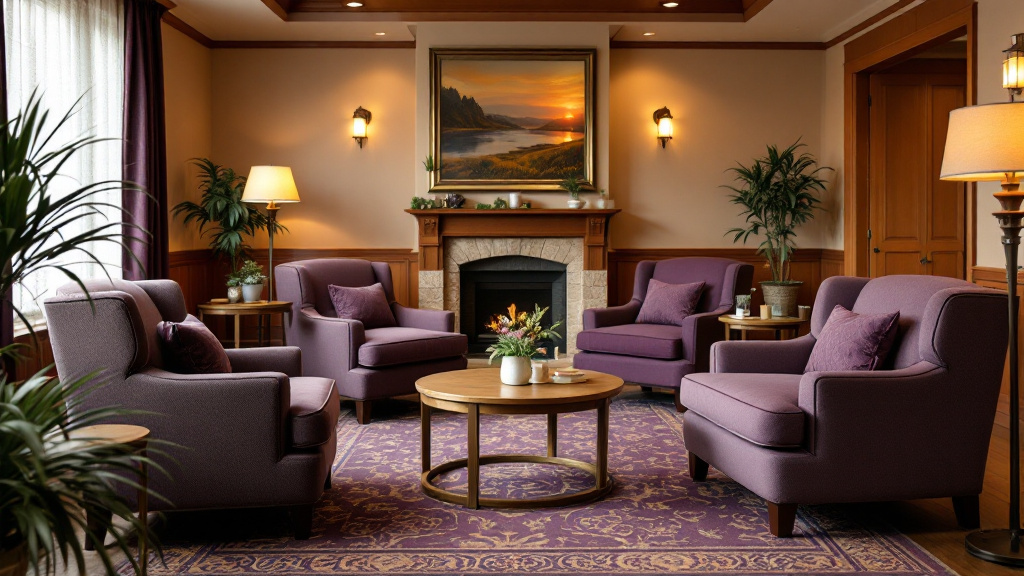Senior Rehab Facilities
Navigating the realm of senior rehabilitation facilities is essential for ensuring that seniors receive the support they need after a hospital stay or health decline. These facilities offer various services aimed at enhancing recovery and rebuilding independence.
Post-Acute Rehabilitation Services
Post-acute rehabilitation services are tailored for seniors who are transitioning from a hospital stay and require additional recovery time and support. These services typically provide a wide range of resources to assist with mobility, pain management, cognitive recovery, and other significant health issues. According to A Place for Mom, rehab centers not only promote quicker recovery for seniors but also alleviate the caregiving burden on families, offering trained professionals to guide the rehabilitation process.
| Service Type | Description |
|---|---|
| Physical Therapy | Focuses on improving mobility and strength through targeted exercises. |
| Occupational Therapy | Helps seniors regain skills needed for daily living activities. |
| Speech Therapy | Supports recovery of speech and cognitive functions. |
An example of a facility specializing in post-acute rehabilitation is New Albany, which offers a comprehensive program that includes both rehab services and assisted living options. This facility ensures that seniors can receive the care necessary to facilitate recovery after hospitalization (Optalis Healthcare).
Assisted Living Programs
Assisted living programs are designed for seniors who may require support with daily activities while also benefiting from rehabilitation. These programs often include 24/7 nursing support and personal care assistance in a comfortable, fully-furnished apartment suite. The Assisted Living Rehab & Recovery program at New Albany specifically caters to seniors needing both housing and comprehensive therapy services (Optalis Healthcare).
Such facilities typically offer a range of services:
| Service Category | Examples of Services Offered |
|---|---|
| Personal Care | Assistance with bathing, dressing, and medication management. |
| Meal Preparation | Nutritious meals prepared according to dietary needs. |
| Social Activities | Organized events to foster socialization and engagement. |
Seniors in assisted living programs benefit from communal support as they work on their recovery, ensuring they remain connected and engaged within their community. Assisted living options can be an ideal choice for those who desire to stay active and social while receiving necessary care and rehabilitation. For a closer look at different senior care options, including assistance available in assisted living suites, explore our page on what is assisted living for seniors.
Types of Rehabilitation Programs
Rehabilitation programs for seniors play a crucial role in helping them regain independence and improve their quality of life. These programs can be categorized into two main types: inpatient rehabilitation and outpatient rehabilitation.
Inpatient Rehabilitation
Inpatient rehabilitation is designed for seniors who need extensive care and monitoring after a medical event, such as surgery or a serious illness. These programs provide a structured and supportive environment where patients receive round-the-clock medical attention and therapy. The focus is on intensive physical, occupational, and speech therapy, allowing seniors to recover more effectively.
Here are some key features of inpatient rehabilitation programs:
| Feature | Description |
|---|---|
| Care Level | 24-hour medical supervision and assistance |
| Typical Duration | 1-4 weeks, depending on individual needs |
| Therapeutic Activities | Physical therapy, occupational therapy, and recreational activities |
| Ideal For | Seniors recovering from major surgeries, strokes, or severe injuries |
Inpatient settings allow healthcare professionals to evaluate and respond to any complications that may arise during recovery. For more information on rehabilitation options, visit our article on rehabilitation for seniors.
Outpatient Rehabilitation
Outpatient rehabilitation, on the other hand, is suitable for seniors who require therapy but do not need to stay overnight at a facility. This option allows them to attend therapy sessions while living at home or in assisted living environments. Outpatient programs often include physical therapy, speech therapy, and occupational therapy, providing flexibility for the patient's schedule.
Key aspects of outpatient rehabilitation include:
| Feature | Description |
|---|---|
| Care Level | Periodic therapy sessions without overnight stay |
| Typical Duration | Varies based on individual treatment plans |
| Therapeutic Activities | Continued therapy tailored to specific recovery goals |
| Ideal For | Seniors needing post-operative care or rehabilitation for minor ailments |
This flexible approach accommodates the lifestyles of seniors, allowing them to maintain a sense of normalcy while receiving care. Explore options for fitness and rehabilitation in your area with our guide on fitness for seniors near me.
Both inpatient and outpatient rehabilitation programs are essential components of senior care, focusing on tailored support to help individuals regain their independence and improve their overall well-being. Each type of program offers unique benefits, catering to the varying needs of seniors in recovery.
Senior Care Options
When considering rehab for seniors near me, it is essential to explore the various senior care options available. Two significant forms of care for seniors include extended care services and assisted living suites.
Extended Care Services
Extended care services are designed for seniors who require additional assistance with daily living tasks. Facilities that offer these services often ensure that residents live in a comfortable and friendly environment, supported by compassionate professionals. For example, in New Albany, residents can benefit from tailored care plans that cater to their individual needs (Optalis Healthcare).
These services can range from help with personal care routines to support for medical needs, providing families with peace of mind. Extended care services may also include access to recreational activities and social engagement to enhance the overall wellbeing of the residents.
| Service Type | Description |
|---|---|
| Personal Care | Assistance with bathing, dressing, and grooming |
| Medication Management | Support with medication scheduling and administration |
| Rehabilitation | Physical, occupational, and speech therapy services |
Assisted Living Suites
Assisted living suites are an excellent option for seniors who require minimal assistance with daily living activities. Facilities like New Albany offer spacious, private assisted living suites that provide a balance between independence and support. These suites are tailored for seniors who may need help with activities such as bathing, dressing, grooming, and medication management.
The design of these suites typically promotes safety and ease of movement, incorporating features that aid those with mobility challenges. Residents benefit from a community atmosphere where they can participate in social activities and maintain an active lifestyle.
| Suite Features | Benefits |
|---|---|
| Private Rooms | Offers a personal space for residents |
| Supportive Staff | Accessibility to help with daily needs |
| Organized Activities | Opportunities for social interaction and engagement |
Both extended care services and assisted living suites aim to enhance the quality of life for seniors, offering tailored support to meet daily challenges. Understanding these options can guide families in making informed decisions regarding their loved one's care. For more information about the available services, consider exploring options such as rehabilitation for seniors or occupational for seniors.
The Importance of Senior Rehab
As seniors navigate the challenges of aging, rehabilitation plays a crucial role in their recovery and independence. Senior rehabilitation is a specialized form of care designed to help elderly adults recover from injuries, surgeries, and serious medical events. This care can take place in rehab facilities, in-home services, or assisted living communities (A Place for Mom).
Benefits of Senior Rehabilitation
Senior rehabilitation offers a variety of benefits that aid recovery and enhance quality of life. Some of the key advantages include:
| Benefit | Description |
|---|---|
| Improved Mobility | Rehabilitation helps seniors regain strength and movement after injuries or surgeries. |
| Pain Management | Specialized therapies can assist in reducing pain and discomfort. |
| Enhanced Cognitive Skills | Cognitive therapies are included to support brain health after medical events. |
| Personalized Care | Rehabilitation programs are tailored to the individual's needs for effective support. |
| Social Interaction | Participating in rehab offers opportunities for social engagement, combating loneliness. |
The most common reasons seniors seek rehabilitation include musculoskeletal problems, recovery after joint replacement surgeries, strokes, and severe infections like pneumonia (A Place for Mom).
Rehabilitation for Common Medical Events
Several medical events or conditions frequently lead seniors to require rehab services. This includes:
| Common Medical Event | Description |
|---|---|
| Joint Replacement Surgery | Rehab helps with mobility and strengthening post-surgery. |
| Stroke Recovery | Specialized programs focus on regaining motor skills and cognitive abilities. |
| Severe Infections | Assistance is provided for recovery and to regain independence. |
| Falls and Fractures | Rehabilitation aids in strengthening and preventing future falls. |
After hospitalization, seniors often need a comprehensive array of resources available through rehab centers to maximize recovery. Whether addressing mobility, pain management, or cognitive improvements, these facilities provide essential support (A Place for Mom).
For those seeking care options, understanding the benefits of senior rehabilitation offers insight into the importance of finding appropriate rehab for seniors near me.
Locations for Senior Rehab
Finding the right location for rehabilitation services is essential for seniors recovering from illnesses, surgeries, or injuries. There are two primary options for rehabilitation: in-home rehab services and skilled nursing facilities.
In-Home Rehab Services
In-home rehabilitation services provide personalized care in the comfort of an individual's home. This service is ideal for seniors who prefer to recover in familiar surroundings. Home health agencies typically facilitate these services, which may be covered by Medicare, Medicaid, or long-term care insurance.
The median cost of in-home health care is approximately $6,300 per month. This option enables seniors to receive physical, occupational, or speech therapy without leaving their home, making it a preferable choice for many.
| Service Type | Description | Median Monthly Cost |
|---|---|---|
| In-Home Rehab | Personalized care at home, includes therapy | $6,300 |
Skilled Nursing Facilities
Skilled nursing facilities (SNFs), commonly referred to as rehab hospitals, are designed for seniors who require 24-hour nursing services and specialized medical attention. These facilities offer both short-term rehabilitation and long-term care, making them suitable for those who need intensive therapy following hospital stays.
In skilled nursing settings, rehabilitation services are often provided alongside medical care, ensuring that all aspects of a senior’s health are monitored and addressed. The median monthly cost for a semi-private room in a skilled nursing facility is approximately $8,669, while a private room costs around $9,700.
| Facility Type | Description | Median Monthly Cost |
|---|---|---|
| Skilled Nursing Facility | 24-hour nursing care and rehabilitation services | $8,669 (semi-private) $9,700 (private) |
Choosing the right type of rehabilitation service can significantly affect a senior's recovery process. For those leaning towards home-based rehabilitation, it's essential to consider the support available at home and the potential benefits of in-person therapy. For further information on rehabilitation services, explore our guide on rehabilitation for seniors.
Specialized Rehab Centers
Seniors seeking rehabilitation have access to specialized facilities that cater to their unique needs. In this section, we will explore rehab centers in Ohio and feature some notable treatment centers.
Rehab Centers in Ohio
Ohio is home to a diverse array of rehabilitation centers that specifically address the needs of older adults. These facilities typically provide services covering addiction recovery and mental health support, including treatment for depression, anxiety, and trauma. A research team has evaluated the 20 best treatment centers in the state, ensuring quality care for seniors (Recovery.com).
| Rehab Center Name | Location | Services Offered |
|---|---|---|
| Recovery Works Columbus | Columbus, OH | Customized treatment plans, budget-friendly options |
| SUN Behavioral Columbus | 880 Greenlawn Ave., Columbus, OH 43223 | Mental health services for older adults |
| Cedar Oaks Wellness | 6161 Oak Tree Blvd, Independence, OH 44131 | Comprehensive wellness services for seniors |
Featured Treatment Centers
Several treatment centers stand out for their exceptional services tailored to seniors. The following centers have been recognized for their commitment to quality care:
Recovery Works Columbus: This facility is budget-friendly and accredited by CARF. It offers customized treatment plans designed specifically for older adults, making it a great option for those in need of financial flexibility (Recovery.com).
SUN Behavioral Columbus: Located at 880 Greenlawn Ave., this center focuses on mental health services, providing a supportive environment for older adults facing various mental health challenges (Recovery.com).
Cedar Oaks Wellness: This center, situated at 6161 Oak Tree Blvd, specializes in providing a range of wellness services for seniors, ensuring comprehensive support for their rehabilitation journey (Recovery.com).
Finding the right options for rehab for seniors near me can significantly enhance the recovery experience, especially when tailored to the specific needs of older adults.





































































































